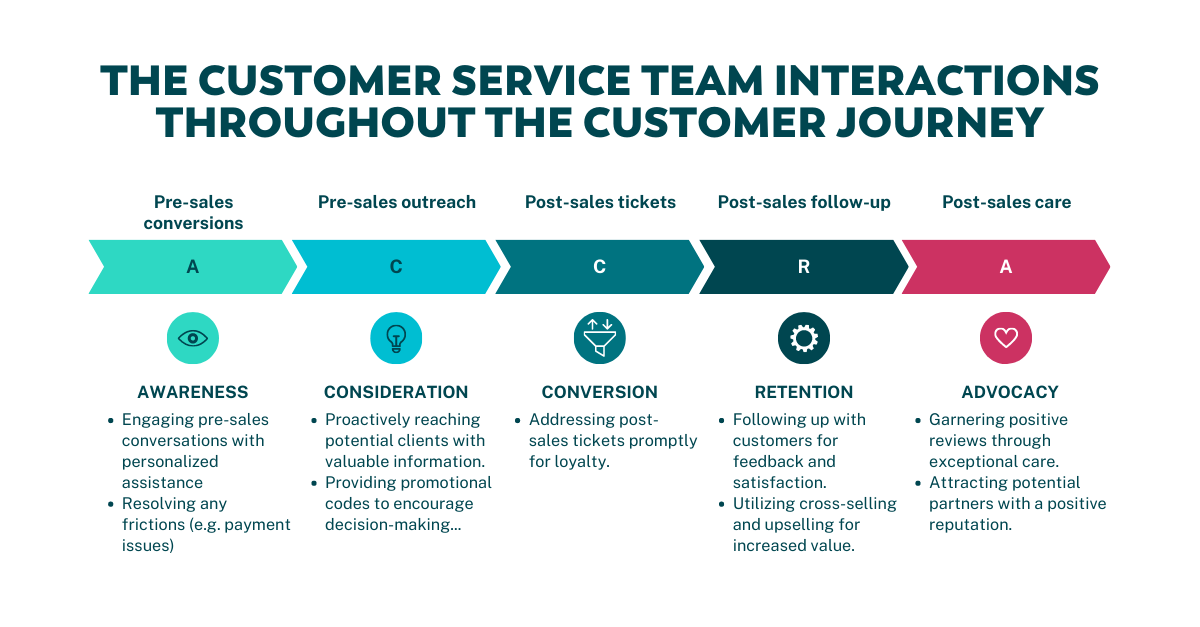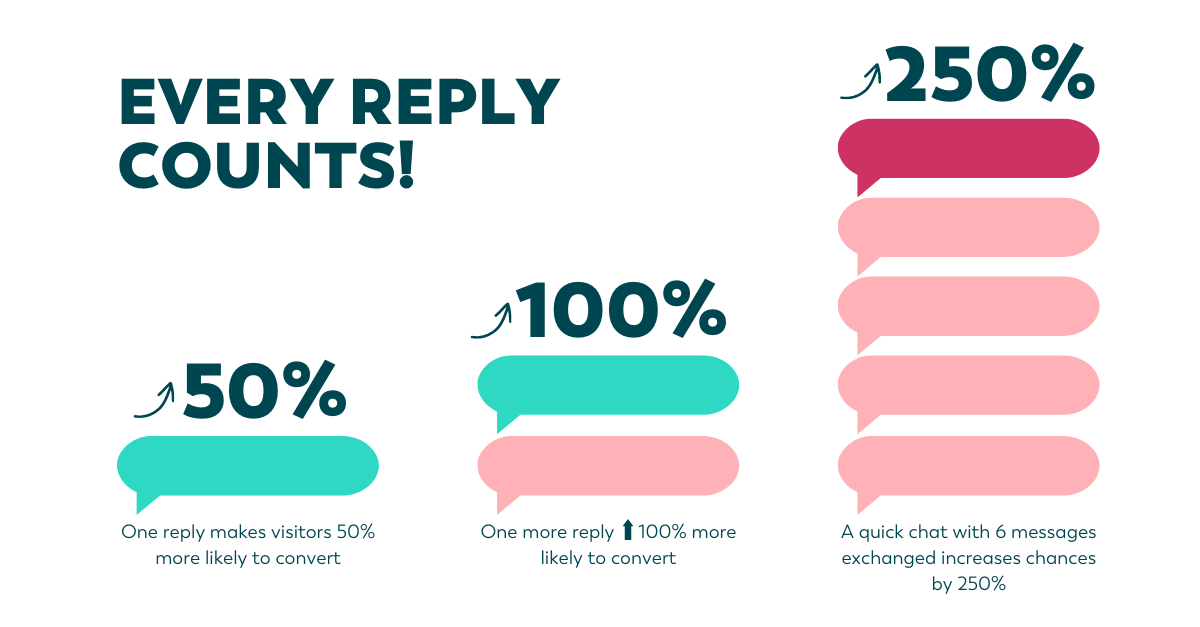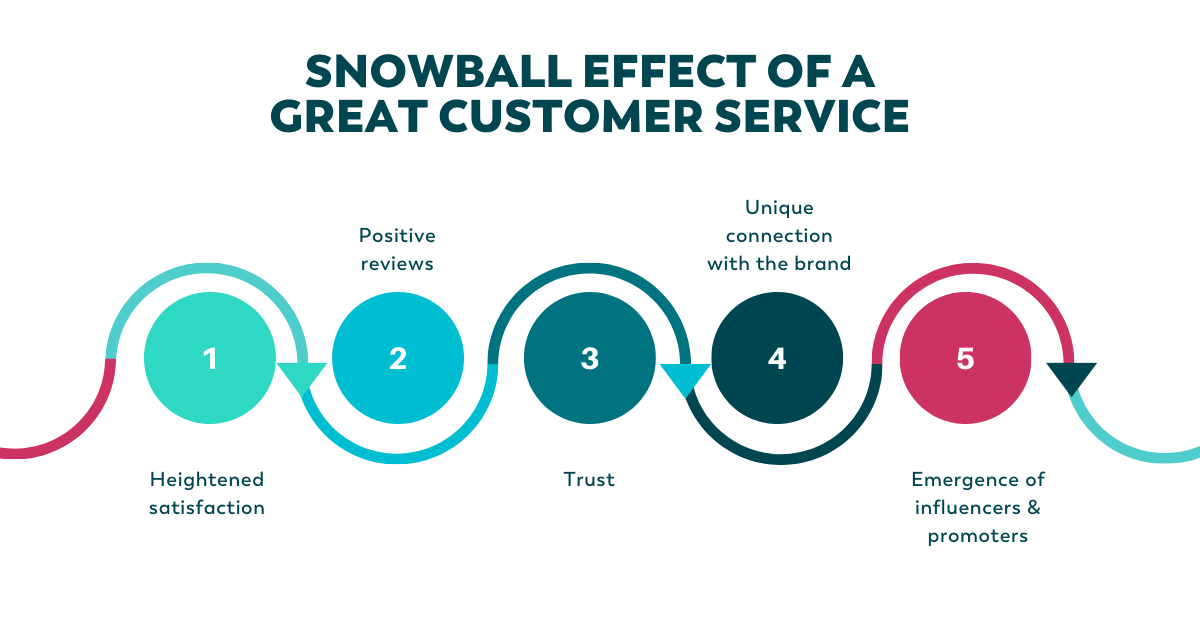Picture this: You’re sitting with your friends, and you can’t help but start a passionate rant about the terrible customer service you recently endured. Whether it was a last-minute flight cancellation or a missing delivery that took a frustrating two months to resolve.
These scenarios resonate with all of us, leaving a sour feeling of being unheard and undervalued by the company’s customer service, especially after enduring endless loops of automated phone menus. These conversations often lead to a unanimous agreement that having a caring customer service, no matter the complexity of the issue, would be worth an additional fee.

Now, the question arises: Why does it seem like companies don’t prioritize customer service when it actually matters so much?
First, who better than your own customers to tell you whether your product fits their needs and expectations or requires improvements? Take advantage of this infinite source of feedback by having an exceptional customer care team working hand-in-hand with all functions of your business, from product teams to tech teams.
Moreover, in today’s business landscape, having an exceptional customer experience is of paramount importance. Customers are more informed, connected, and vocal than ever before, and their expectations have reached new heights. They now demand personalized interactions, quick resolutions, and a seamless journey across all touchpoints. Companies that prioritize customer care gain a competitive edge by building trust, fostering loyalty, and generating positive brand sentiment.
The influence of social media and online reviews amplifies the impact of a single negative customer experience, potentially causing significant damage to a company’s reputation. Conversely, consistently delivering exceptional customer experiences can trigger a virtuous cycle of customer advocacy, referrals, and sustainable business growth.
As such, providing an outstanding customer experience is no longer a mere choice for companies; it has become a strategic imperative for businesses seeking to thrive in the modern market.
So, why would companies hesitate to reduce their acquisition costs, maximize customers’ lifetime value, and benefit from the voice of the customer to improve their offerings? Embracing exceptional customer service is the path to success, enabling businesses to flourish and stand out amidst the competition.
Building a top-notch customer support team equipped with the top tools might seem challenging at the beginning, but the rewards are substantial! Here are only some of the many direct benefits of such a dream team.

Engaging in pre-sales live conversations significantly affects conversion rates.
These discussions can occur through various channels (phone, chat, email, video, etc.) and can serve various purposes, such as resolving payment issues or even just creating that human connection with a potential customer. In some instances, these personalized interactions have the remarkable potential to double conversion rates.
Moreover, addressing potential customer concerns during pre-sales interactions can alleviate fears, build trust in your brand’s reliability and credibility, and shape the customer’s perception of your brand. Consequently, leading to higher sales overall. Additionally, personalized recommendations and tailored assistance help customers find products or services that meet their specific needs and preferences, significantly increasing the likelihood of making a purchase.

Your customer support team has the potential to go beyond mere client inquiries. As mentioned earlier, the customer service team can act as salespeople, handling both pre-sales and post-sales tickets. However, they can also take it a step further by implementing proactive outbound approaches to convert potential clients who are on the brink of making a decision.
By identifying opportunities like early checkout indicators or queries on forums and social networks, your customer support team can initiate contact with prospective clients. They can provide valuable information on products and services or extend promotional codes, effectively converting potential customers and projecting a considerate and attentive brand. This proactive approach not only increases the chances of acquiring new clients but also showcases your company’s commitment to excellent customer care and satisfaction.
This process involves increasing value after a customer has completed a purchase. This can be done for instance by addressing any issues or concerns the customer may have whether regarding returns or refunds, warranty claims, etc.
By paying attention to post-sales tickets and providing excellent support, you can build stronger customer relationships, encourage loyalty, and potentially acquire additional customers through positive word-of-mouth and referrals.
And remember! It’s 5 times more expensive to acquire a new customer than to keep selling to a current one (Forbes).
So, go beyond the initial sale and continue to nurture customer relationships to maximize long-term benefits!
Furthermore, your customer support team can extend their support to clients after their initial purchase, effectively enhancing your customers’ LTV through various initiatives, including cross-selling and upselling strategies. Following up with customers following their purchase and seeking feedback can significantly boost customer satisfaction. By skillfully incorporating relevant product recommendations into the conversation, you may even secure additional orders through cross-selling. Moreover, your proactive team can contact clients to offer refills or suggest complementary products, utilizing upselling techniques to further increase their engagement and potential for repeat business. This proactive and personalized approach showcases your commitment to customer care, ultimately fostering stronger relationships and encouraging customers to stay loyal to your brand while maximizing revenue opportunities.
Elevating customer lifetime value through exceptional customer care is a strategic approach that businesses can adopt to foster stronger customer loyalty and maximize revenue potential. By prioritizing top-notch support and personalized experiences throughout the customer journey, you can leave a lasting positive impression on your clientele. As mentioned above, satisfied customers are more likely to become repeat buyers, advocate for the brand, and even explore higher-tier products or services. 89% of consumers are more likely to make another purchase after a positive service experience (Salesforce Research).
Moreover, exceptional customer service can prove invaluable to companies when their customers encounter less-than-satisfactory experiences. For example, if your payment system doesn’t accept foreign credit cards, your customer service team can offer a solution through a payment link, effectively saving a sale. Or, when product instructions are unclear, a customer service representative can guide how to use the product until your product or tech team resolves the issue. In this way, your customer service ensures that customers can continue using and enjoying your products while waiting for any necessary fixes.
Thus, by nurturing these relationships and continuously delivering exceptional care, businesses can extend the lifetime value of each customer, contributing to long-term profitability and sustainable growth.
Exceptional customer service yields direct and immediate benefits, including improved conversion rates, improved CLTV, and a higher number of repeat orders, showcasing the immediate impact of your customer service department’s efforts. However, the true value of exceptional customer service goes beyond these immediate gains.

With customer satisfaction rising, a snowball effect will occur: heightened satisfaction leads to positive reviews, which in turn foster trust, bringing a unique connection with your brand, which then leads to higher satisfaction and reviews! Moreover, the snowball effect extends further, with influencers and promoters emerging on forums and social media, amplifying the positive impact of exceptional customer service.
The significance of reviews in consumer decision-making is evident, with a staggering 93% of consumers reading online reviews before making a purchase. Moreover, a remarkable 84% of consumers trust online reviews as much as personal recommendations (Gitnux), underscoring the critical role reviews play in shaping purchase behaviour. Therefore, ensuring an exceptional customer experience becomes paramount to garnering positive reviews especially as they increase sales by 18% on average (Dixa)!

Exceptional customer service not only leads to immediate benefits like improved conversion rates and customer loyalty but also acts as a tool for refining policies and procedures. By analyzing customer feedback, businesses can pinpoint pain points and areas of friction experienced by customers, allowing them to make informed decisions on policy updates that align with customer expectations. This continuous process of listening to customer feedback and adapting accordingly leads to an enhanced customer experience, increased customer loyalty, and ultimately higher returns on customer service investments.
Indeed, the impact of exceptional customer service extends beyond satisfying existing customers; it plays a crucial role in shaping prospective connections with partners, investors, purchasers, and the media.
By delivering outstanding customer service and fostering a loyal community, your company gains access to a wealth of invaluable content, creating opportunities for keynote speaking invitations, press coverage, and even recognition on platforms such as Reddit! This visibility and positive reputation attract interest from potential investors, buyers, and partners, as they perceive your company as being knowledgeable, robust, and efficient.
The quality of your customer service and overall customer experience becomes a testament to your company’s values and professionalism, making it more appealing to great partners eager to collaborate with a trusted and reliable entity.
So, make your customer service shine and let it sing the praises of your brand!
Customer support is like a treasure box of information useful for all departments: marketing, product development, tech and many others.
Utilizing customer feedback can be a game-changer for maximizing marketing efforts. Understanding how customers discover your brand allows you to pinpoint the most effective channels that bring customers the highest lifetime value. Moreover, it helps identify your Brand Promoters, those loyal customers who actively advocate for your brand. Analyzing customer feedback can also unveil what specifically resonated with your audience in your recent advertisements, allowing you to refine your marketing strategies.
Moreover, since your customer service team is in constant contact with customers, they have the deepest knowledge of customer needs, the issues they face with the product or service, etc. Make sure to leverage this knowledge by keeping the customer success and product team close together in order to continuously improve your product or service! Your customer success team should be your key to product and service development and consequently customer satisfaction.
Of course, this is not only applicable to R&D but also to improvements of the website, the FAQ page, the delivery policies, or other frictions…

Okay, so you get the gist of having excellent customer service! But in any case, let us give you some last statistics:
Below, we will demonstrate how to calculate the ROI of customer service. By getting concrete data, you’ll get to underscore the significance of enhancing your customer service.
Okay so might be expecting a magic formula to calculate this, unfortunately, it is not that easy.
Calculating the ROI of customer service involves two crucial factors (applicable for all ROI calculations):
Although for sales teams, this process is relatively straightforward since the revenue generated by a sales rep can be directly tied to their costs. For customer service teams, it can be more challenging to determine the precise monetary value of the benefits they bring.
To measure customer service ROI effectively, consider the following steps:
Begin by thinking about the specific actions you would like your customers to take that contribute to upgrades, retention, or expansion income. For instance, ‘Moving from Standard Plan’ to ‘Plus Plan’ (upgrade)
Note down these behaviours and then determine the customer service team’s behaviours that can positively impact these actions.


Combine the customer service team behaviours and customer actions into active statements using the template: “When (customer service team behaviour), our customers will (customer action).” For example, “When we deliver consistently high-quality service, our customers will keep their monthly subscription with us instead of cancelling it.”
This leaves you with 2 questions:
Focus on metrics that you can measure and influence within your team’s control, such as Net Promoter Score (NPS), Customer Satisfaction (CSAT), cost per contact, cost per conversation, customer lifetime value, retention rates, and contact rates. Monitor and benchmark your support team’s performance using these metrics.
You’ll be able to notice some close correlation between support activities and ROI, for instance: ‘Customers who contact support in their first month, end up staying x% longer than those who weren’t contacted the first month.’
Here are some of the ways to measure the value of customer service
CSAT functions work as a proxy for CLTV. Each incremental increase in CSAT represents a higher likelihood of customers coming back to the brand and buying more.
This information can be gathered through customer feedback. For instance, after a customer service interaction, ask customers to rate their experience on a scale of 1 to 5 (1 being horrible, and 5 being WOW). Divide the total number of satisfied customers (scores of 4 and 5) and divide it by the total number of responses and multiply by 100.
CSAT = (Total number of satisfied responses (4 or 5 ratings) / Total number of responses) x 100
NPS measures a customer’s likelihood to recommend a company to others, effectively serving as word-of-mouth marketing generated from excellent customer experiences.
Calculating NPS is simple if you’re already gathering customer feedback. Include a question like, “On a scale of 1-10, how likely are you to recommend us to a friend?” in your post-interaction survey. From the responses, note the following information:
Then calculate your NPS using this formula:
NPS = Percentage of promoters – Percentage of detractors
Repeat customers are a great indicator that your customer service program is doing well, so it’s essential to consider them during your ROI evaluation.
As mentioned above, you need to recognize that customer support is an invaluable source of information on customers. If your team has the skills, the systems and internal support to collect and collate that information, they will be a continuous source of feedback to the rest of the company. As such, you need to track metrics like the number of bugs reported, feature suggestions added, and sales leads generated through support interactions to also measure the ROI.


Once you’ve identified the customer behaviours your team can influence and their impact on company success, conduct small, measurable experiments with individual ROI figures. For instance: ‘Investing in one more staff member for U.S. time zones at $X/year could reduce first response time by two hours. We expect an improvement in our CSAT, which we find collates strongly to higher CLV’.
This focused approach allows for a more solid ROI at this scale than it could be for customer service as a whole.
Not every investment in customer service will produce the same return rate. Different initiatives or improvements may yield varying results over different timelines. Be prepared to measure ROI for each aspect separately rather than trying to tie everything into a single percentage.
Emphasizing the significance of enhancing customer service through concrete data will empower you to make informed decisions as to how to improve it. Ultimately, investing in exceptional customer service is not only a means to maximize financial gains but also a powerful strategy to build lasting customer loyalty and solidify a strong position in the competitive market landscape.
Below, are some of the ways to improve your ROI!
Improving your customer service ROI is a paramount goal for any forward-thinking business. It involves enhancing the overall customer experience while optimizing resources to achieve maximum returns.
Here are some ways to improve your customer service ROI
Investing in the continuous training and education of your customer service team is crucial to maximizing customer satisfaction.
In fact, providing training for your customer service team is essential as it leads to enhanced customer satisfaction, consistency in service, and deep product and process knowledge. Well-trained representatives can effectively resolve conflicts, identify upselling opportunities, and reduce response times, creating a positive customer experience and fostering loyalty.
While initial onboarding provides a foundation, ongoing training enables agents to stay updated on product developments, industry trends, new technologies and evolving customer expectations. Thus, regular training would allow agents to adapt swiftly to a changing landscape (customer needs, industry changes, etc.) delivering personalized and high-quality support.
However, we understand that investing time and resources for startups can often lead to a lack of focus on the core business.
Therefore, teaming up with an outsourcing company presents a strategic solution. Through collaboration with an experienced outsourcing partner, you can ensure your customer service team receives continuous training and support without diverting resources from your core business or compromising its focus.

Embracing the latest tech and tools is paramount to improving that ROI, especially in today’s fast-paced and digitally driven business landscape. By doing so, you could streamline your customer service processes, and enhance efficiency all while delivering an exceptional experience to your customers. Advanced customer service tools such as AI-powered chatbots, omnichannel platforms and customer analytics enable companies to provide personalized support, anticipate customer needs and resolve issues proactively. Moreover, automation and self-service options can significantly reduce response times and the volume of support tickets, freeing up resources to focus on more complex customer interactions.
To achieve these benefits without incurring substantial investments, partnering with an outsourcing company can be a game-changer. An outsourcing partner is already equipped with the latest technology and tools, ensuring that your customer service team has access to cutting-edge solutions without the need for additional infrastructure costs. They can seamlessly integrate advanced tools into your customer service operations, enabling your team to deliver exceptional support while improving overall efficiency.
Don’t forget to also inquire about the staff turnover rate as it’s important to maintain a table and committed team for your success.

Customer feedback serves as a powerful tool for updating and refining policies and procedures, ultimately leading to a significant improvement in the ROI of customer service. When businesses carefully analyze customer feedback, they can identify pain points, areas of friction, and unmet needs experienced by their customers. Armed with this valuable information, companies can make informed decisions to update their policies and procedures to better align with customer expectations and preferences. By continuously listening to customer feedback and adapting their approach accordingly, businesses can enhance the customer experience, build stronger customer loyalty, and ultimately drive higher returns on their customer service investments.
Partnering with an outsourcing company can greatly facilitate the process of leveraging customer feedback to update policies and procedures. Outsourcing partners, with their specialized expertise in customer service, are well-equipped to efficiently gather, analyze, and interpret customer feedback on behalf of the company. They can employ sophisticated tools and technologies to capture and process feedback from various channels, ensuring that no valuable insights are missed. Armed with a deep understanding of customer sentiments, an outsourcing partner can provide actionable recommendations to enhance policies and procedures, tailoring them to meet the specific needs and expectations of the customer base.
Improving the ROI of customer service involves not only enhancing customer satisfaction but also finding ways to reduce costs. One effective approach to cost reduction is through automation. By automating certain aspects of customer service, businesses can streamline their processes, improve efficiency, and allocate resources more effectively.
Some ways to automate your customer service are:
Implementing AI-powered solutions and workflows can help prioritize and route customer support tickets, ensuring that they are handled by the right teams promptly. For instance, high-volume topics like payment inquiries can be directed to designated agents trained to handle such queries, while technical issues can be forwarded to the relevant team.
Integrating chatbots into the website can provide customers with quick self-service options for simple and specific queries, such as shipping information or product references. Chatbots not only save time for both customers and support teams during peak seasons but also collect structured information to assist agents in handling tickets efficiently.

Did you know that 60% of the total time spent by a customer service advisor relates to back-office tasks (excluding direct interactions with customers)?
As such, by automating repetitive back-office tasks, like updating customer data or sending reminders, customer service advisors can focus more on direct interactions with customers, leading to increased productivity and improved ROI!
Breaking news! An outsourcing partner can play a pivotal role in helping businesses achieve their cost reduction and automation goals. Leveraging the expertise of an outsourcing partner with advanced automation tools and technologies can expedite the implementation of AI solutions, chatbots or triage processes, avoiding the need for extensive development and integration efforts in-house.
As mentioned above, one way to also improve the ROI is by reducing costs (remember the ROI calculation!).
One highly effective strategy for cost reduction is strategic outsourcing. Partnering with an outsourcing company can lead to significant savings without compromising the quality of customer service. By leveraging the global presence of outsourcing providers, businesses can benefit from access to skilled talent and operational efficiency in various regions.
Outsourcing customer service operations to well-established providers in locations with competitive labour costs allows businesses to achieve cost savings while maintaining a high standard of service. These outsourcing partners bring extensive experience, a multilingual talent pool, and expertise in customer service, ensuring consistent and effective support for customers. They offer scalable solutions, enabling businesses to flexibly adjust their support operations based on demand fluctuations without incurring additional overhead costs.
Overall, an outsourcing partner can be a strategic ally in your pursuit of an improved customer service ROI, providing a range of specialized advantages that contribute to your bottom line.
In today’s competitive business world, exceptional customer service is crucial for building trust, loyalty, and positive brand sentiment. It directly impacts revenue growth and customer lifetime value. To achieve outstanding customer service and improve ROI, businesses should invest in continuous training, adopt the latest technology, use customer feedback to refine policies and automate processes.
Strategic outsourcing can further enhance efficiency and reduce costs. At The Nest by Webhelp we understand the importance of exceptional customer service and offer a reliable outsourcing partnership to help businesses thrive.
Check out our comprehensive checklist to choose the right outsourcing partner and elevate your customer experience for sustained success.
So if you’re looking to turn your cost center intro a profit center, reach out to us! We’ll make t happen in no time.
We, at The Nest by Webhelp are the ideal BPO match for your startup. With our expertise and dedication, we can lighten your workload and pave the way for remarkable progress and success.
Thanks to our dedicated outsourcing model focused on agility and flexibility, we already support the growth of some of the world’s most exciting companies (Ankorstore, Gorillas, AirUp or Swile…) on all their CX topics and in +80 languages, with experts dedicated to their brand in more than 60 countries around the world.
Whether you’re looking to outsource your customer care, or sales, payment services or KYC, we’ve got your covered! The Nest offers a wide variety of services, all of which are customized to the client’s individual needs and available 24/7, including:
With our support, optimize your operations, cut your costs, expand internationally (we cover +80 languages)… reach your full potential.